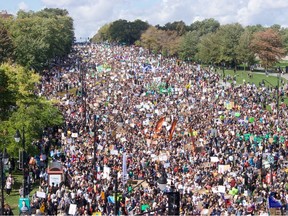Leaders of environmental movements share advice at the National Climate Action Forum conference in Montreal.

Article content
If there is a silver lining to the climate change crisis, it is that the increasing frequency of catastrophes has made it easier to convince the general population that the effects of greenhouse gases are real. Flash floods, record wildfire seasons, prolonged heatwaves and repeated droughts have resulted in greater openness on the part of many to support environmental solutions.
Advertisement 2
Article content
The problem is how to put that will into action quickly on an issue that involves multiple actors, a global energy transformation and billions of dollars.
Article content
“The participation of 500,000 Montrealers in a march on climate change (in 2019) shows that there is awareness on the issue,” said Béatrice Alain, director of the non-profit Chantier de l’économie sociale, based in Montreal. Montreal, which promotes companies working in the social economy. “But there is a lack of information and framework to tell that population what is possible and necessary… to give citizens the tools to create sustainable development.”
Finding ways to provide those tools to citizens, municipalities, businesses and governments is the theme of the National Climate Action Forum’s two-day conference, which began Tuesday in Old Montreal and brought together leaders of Quebec’s environmental movements at a series of forums. . The conference was organized by the Regroupement national des conseils régionaux de l’environnement du Québec.
Cities around the world, with their dense populations and enormous energy needs, face numerous challenges in reducing the use of fossil fuels, but the solutions are easy, said University of Quebec in Montreal professor Florence Junca-Adenot, who specializes in in sustainable mobility. In most cities, populations are increasing and aging simultaneously, they are affected by the effects of global warming and congestion is causing urban sprawl, with the result that people are buying more cars to travel longer distances, shedding more carbon dioxide.
Article content
Advertisement 3
Article content
The solution, Junca-Adenot said, is to rethink urban sprawl by reshaping cities and their suburbs to make them more accessible and durable, with needed services close at hand and more public transportation.
“Cities must become proactive leaders in the solution,” he said. “There is no choice and we have to do it now.”
The problem, said Normand Mousseau, professor at Polytechnique Montréal and director of the Institut de l’énergie Trottier, is that while cities have a role in the development of their territory that can have an effect on energy consumption, the changes can take decades. Meanwhile, industries are major players in terms of creating greenhouse gases, over which municipalities have little control.
And cities may have little influence if Quebec doesn’t keep its promises, Mousseau said.
“The challenge is speed. We will be unable to meet our 2030 targets, as Quebec has not taken any action since we voted on those targets in 2016.
“You can’t magically expect to finish the goals by 2030 after 15 years of inaction.”
Mousseau predicts Quebec’s population will increase by 50 per cent by 2050 due to increased international migration driven in part by the effects of global warming, further hampering the province’s efforts to use less energy.
Advertisement 4
Article content
For climate change solutions to work, they must have an economic logic that fits within an environmental hierarchy, said Alain of the nonprofit Chantier de l’économie sociale. For example, in Quebec, services are currently paid to recycle appliances such as refrigerators, stoves and air conditioners, when it would make more sense to repair and resell them, as is done in certain municipalities, a solution that is better for the environment and also better for the environment. . socially, as it provides access to low-cost appliances. Quebec and Canada need to allocate more of their funds to reuse instead of recycling, or to support local agriculture instead of importing from abroad, Alain said.
For almost 40 years, scientists have been warning us that the situation will get worse if we fail to reduce greenhouse gases, said Alain Bourque, director general of the climate change research group Ouranos. Now is the time for decision-makers and politicians to use science to their advantage.
“It is certain that when we use terms like climate emergency or climate crisis, they are words loaded with emotion,” he said. One of the solutions is to try to rationalize them by going back to science.
“It is not always necessary to make a social decision. “Sometimes there are simply facts that can be used.”
Recommended by Editorial
-

‘A colossal tragedy for the ecosystem’: not enough being done to protect coral reefs, says UN envoy
-

Hydro-Québec has enough energy to meet domestic and export demand, insists CEO
-

Climate change and insects threaten Quebec’s maple syrup industry
Advertisement 5
Article content
Article content



